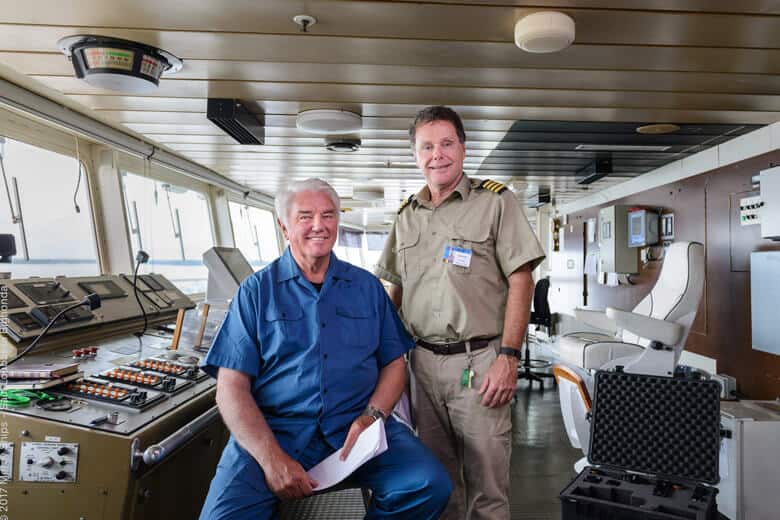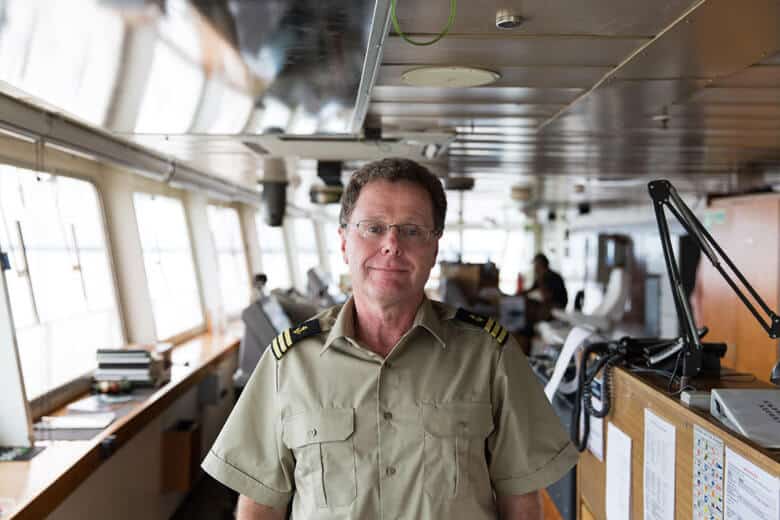After retiring from the offshore oil and gas industry in 2014, 52-year-old Captain Mark Carew, from Fall River, Nova Scotia, started a new chapter in his life by becoming a part-time marine teacher and fulltime volunteer at the soup kitchen of St. Mary’s Basilica in Halifax.
It wasn’t long, however, before the sea — and his desire to serve — called him back and Carew discovered medical charity Mercy Ships. For the next four months, Carew is paying his own way to live and work as Chief Officer on board the world’s largest charity hospital ship, the Africa Mercy, in Douala, Cameroon.
“My daughter’s boyfriend was trying to get into medical school and looking for volunteer opportunities. He told me about Mercy Ships and I went online to learn more about the organization. It took me only moments to know that this was what I wanted to do because the job matched my skill set and I have worked most of my life in countries off the west coast of Africa,” said Carew.
Carew is a Master Mariner, who originally applied to be Master; however. the position required a long-term commitment for continuity and logistics purposes, and it was requested that he work as Chief Officer.
Born in Goose Bay Labrador on a United States air force base, Carew moved with his family to St. John’s, Newfoundland and then onto Nova Scotia in 1987 where he met his wife, MaryAnne, and had two daughters. Carew started out his work life as a deep sea commercial diver working on dive ships and oil rigs offshore Canada and the Gulf of Mexico.
Although an incredible career, it was also a very dangerous one. Carew returned to school to study Nautical Science at Memorial University of Newfoundland, and after 10 years of working as a marine officer on diving ships and offshore supply vessels around the world, he received his Master Mariner licence and became a specialist in Dynamic Positioning.
Carew arrived in Cameroon on September 1. He shared that the hardest part has been leaving home.
“You would think that I’d be used to this after working on or under the sea for 30 years. It has been three years since I retired and I have intentionally become soft during that time.”
Despite missing his family, Carew’s first days on board were exceptional:
“The food is great and the people are amazing. I met some Canadians — one is a pharmacist and her husband is a biotech. They have been here a while and seem to be well placed. This type of commitment humbles me greatly,” said Carew.
Why people choose to volunteer and how they are able to devote years and decades to the Africa Mercy are questions Carew and many others have asked. What Carew has observed so far is that “some crew are here because of their faith, some are here because of their expertise and to gain experience they could not find at home, some are here because they want to experience the seafaring way, and some want to make a difference in the world.
Not only do they want to volunteer and not get paid, but they pay their own way to work here. That makes it even more special because it shows even more conviction to serve.” Carew, who will work 40 hours a week on board, has been immersed in quite a different work environment than his past jobs.
“The welcome was friendly and everything was very organized. I am used to working 14 hours a day, seven days a week and being under pressure to perform from the oil companies. The atmosphere here is laid back but efficient” said Carew.
The age of the Africa Mercy means limited marine technology, but Carew finds it enjoyable to remember how things were done before he ditched retirement to volunteer for Mercy Ships.
“I hope to attend a class in celestial navigation using a sextant that the third mate is offering. It has been many years since I have taken a sun or star sight or amplitude, but it was my favorite subject in nautical college,” he said. “My ships have been dynamically positioned and we would keep the ship on location or move the ship within a quarter metre of the setting desired. I had three gyro compasses with triple redundancy and here they are doing magnetic compass corrections. It will be a little while before I’m used to it.”
Although the Africa Mercy sails twice a year, she is a hospital for the remainder.
“The hospital is by far the most important duty we have, and I am honoured to be part of a team and organization that provides free medical care to people who really need it but have no way to achieve it,” said Carew.
As patients walk up the gangway for the first time, Carew is reminded of how his role is helping change people’s lives.
“A tiny baby with a cleft palate came on board. The baby was covered because of the deformity and I only saw a tiny hand sticking out of the covering. They were bringing her on early after screening to feed the baby and teach the mother how to do this. I felt a stab in my heart as I saw this. I thought she is too young to operate on and wondered how they would help her. I remembered in that moment why I am here and why the ship is here.”
As patients walk up the gangway for the first time, Carew is reminded of how his role is helping change people’s lives.
Original article found in BC Shipping News.



